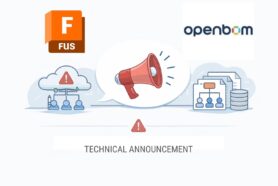
It seems like as the global supply chain complexities grow, so do the disruptions that impact manufacturing. Global events, such as COVID, the chip shortage, the trade war, port closures, labor shortage, inflation, and more have pushed many manufacturers into panic mode.
Also, as manufacturing becomes more complex, the buyer has evolved to needing products instantly and with greater visibility into the supply chain. As a result, manufacturers will migrate to those contract manufacturers and suppliers who will also step into the digital age with them.
Today’s post will be about how suppliers can increase their value and gain more business by adapting to digital transformation.
Digital Transformation Goal
The goal of digital transformation is to improve the efficiency of your business and to create an environment to make better decisions. For suppliers, this means improving their customer experience by reducing barriers through the development, buying, and production processes.
Here are reasons why suppliers must adapt to digital transformation in order to stay ahead of the competition.
Make Better Decisions Faster
A diverse supply chain has always been important. But now, if you are not diverse you will lose customers. For example, if you can’t fully assemble your product because you are waiting for a component it can result in your customers buying somewhere else. Therefore, companies that are able to fulfill orders and navigate through chaos will thrive. Those who can’t navigate will fail.
In order to make better decisions, you need to have data. You need to update this data and you need to share this data with other stakeholders. If you are a supplier, you need to provide your clients with the following info quickly:
- Alternative components for all parts
- What are the lead times
- Transparent pricing
- Current status of all parts/assembly
- For off-the-shelf component suppliers – an intuitive site to make purchases
If you fail to provide this data quickly or you work with the wrong data, you risk your client getting irritated on missing out on sales and changing suppliers.
Improved Collaboration
Collaboration has always been important. The idea that we are greater as a team than we are as an individual is not new. But now with the global workforce of remote working, the exposure to poor collaboration is greater than ever.
As a supplier, you need to provide the foundation to enable collaboration. Usually what suppliers do is share their BOM in excel, put CAD files on Google Drive, WeTransfer, or Dropbox, and pass around emails to request and approve changes. This creates separate data silos that spread old data that causes errors in purchasing, development delays, and more. This all results in a loss of revenue and decreased margins.
A supplier that controls the supply chain and production for their client needs to digitalize their processes to improve collaboration. If you are supporting a client with design for manufacturing (DFM), then you need to create a single source of truth for all data with regard to the development project. These include:
- A database to store CAD files
- A historical record of all changes/revisions
- A workflow for all change requests and approvals
- Track all parts during prototypes
To have total collaboration, all four of these items listed above should be managed on the same system. Having this data, files, workflows, and more offered to everyone at any time will create the collaboration you need in order to stay ahead of your competition and win additional business.
Buying On Demand
This one will not be for all suppliers. However, if you are manufacturing fasteners, pipes, electrical components, and other off-the-shelf components, you must provide your buyers with an easy transparent way to purchase. Think McMaster-Carr and DigiKey.
The number of in-demand services is growing and to adopt this new way of selling and buying components is extremely important to stay competitive.
If you do not provide this easy interface to purchase parts, your clients will leave you for another supplier who has simple purchasing that can be done on the website, rather than reaching out to sales.
Improves Your Relationship
If you are taking the digital transformation steps then your clients will be more satisfied. Satisfied customers lead to longer relationships and more business.
What can you do today?
If you are a contract manufacturer or a sub-contractor looking to improve the relationship with your clients, then digitalizing your processes is a much-needed step. The digital transformation will keep all of your product data together and manage your revisions and create an ECR/ECO process. Your solution is a centralized platform that connects your team, contractors, and suppliers.
OpenBOM is a cloud-based PDM & PLM platform to manage your engineering and manufacturing data. Companies from startups to Fortune 500’s use OpenBOM to create a centralized database to bring in, store and manage their manufacturing data. With this infrastructure, users also use OpenBOM to streamline both their change management and PO processes.
If you need to improve the way you manage your data and processes, share data instantly or collaborate with contractors and suppliers, contact us today for a free consultation.
Regards,
Jared Haw
Join our newsletter to receive a weekly portion of news, articles, and tips about OpenBOM and our community.










